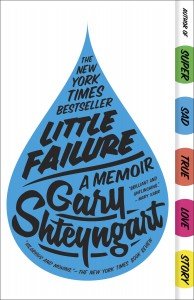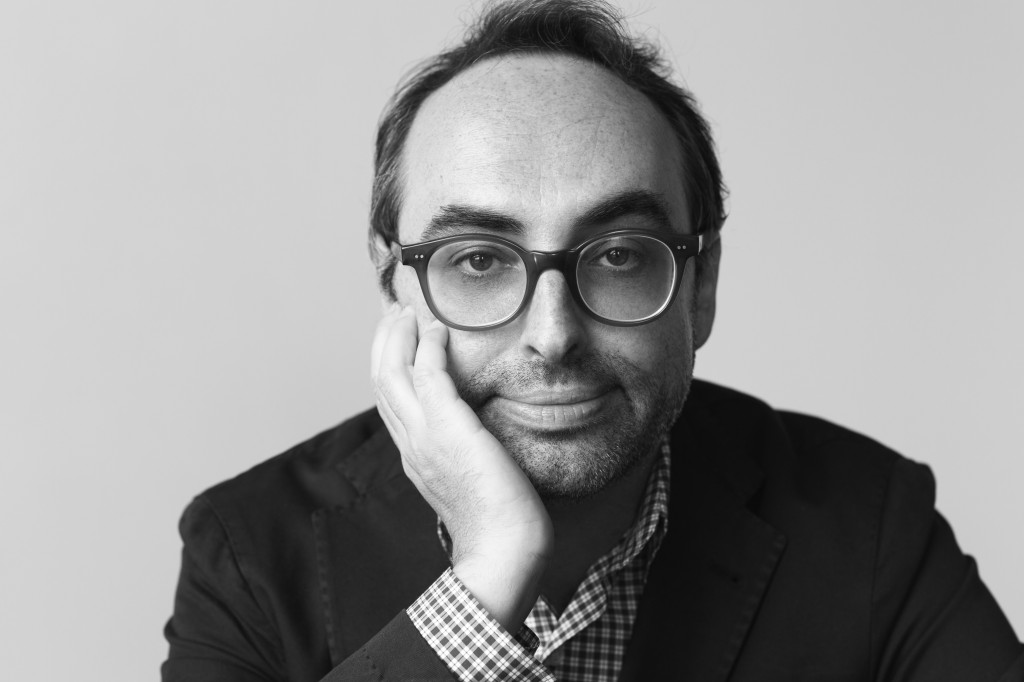On October 6 at 7:00 p.m., Gary Shteyngart will be reading from his 2014 memoir, Little Failure, at the Beachwood branch of Cuyahoga County Library. Belt’s Editor-in-Chief Anne Trubek talked to Shteyngart about his experiences living in Northeast Ohio, what Cleveland needs to do to be more like Donestk, and how much lorazepam to take before a reading. Both Shteyngart and Trubek graduated from Oberlin College, where Trubek has taught since 1997.
BELT: You lived in Northeast Ohio for four years while an undergraduate at Oberlin College. Many Oberlin students live in what they refer to as the “Oberlin bubble” and graduate without a real sense of the culture, geography and economics of the region of Lorain County and Northeast Ohio. Some simply refer to it as the “boondocks” later in life and reminisce about when they once lived in the Midwest. But some become very involved and invested in town, surrounding communities and region. What was your experience like? What sense of Lorain County, Cleveland and/or Northeast Ohio did you take away from your four years here?
Gary Shteyngart: I grew up in the Soviet Union, a working-class dystopia par excellence, so I loved Lorain County! It felt very much at home. Parts of Ohio felt very New Jersey-like, but Lorain had a real spirit of decline that made me feel at home. I’ve heard of Oberlin referred to as The Plantation and it did have this very manicured feel to it. Good lord, how much does the college spend on gardening? There was really no town/gown connections. Once some tough dudes in a pick-up truck screamed at me: “Queerberlin! You guys are a bunch of democrats!” And I thought, democrats? We’re all pretty much hardcore Maoists by sophomore year.
BELT: Depending upon the answer to the above, you may or may not know that Cleveland suffers from a very peculiar inferiority complex. This was most brilliantly and accurately labeled “reverse schadenfreude” by Austin Ratner, a Clevelander, in a piece he wrote on similarities between Cleveland and Jews: both take joy in their own failure. (I will note here that I am a Jewish Clevelander, not by birth but through transplant) The name of your memoir is Little Failure and it describes your Russian Jewish immigrant story and relationship to your parents. You have expertise on just this sort of inferiority complex! What assistance might you provide Clevelanders — seeking helping professionals — or books — to help them reverse their reverse schadenfreude?
GS: Well, why doesn’t Cleveland host the next Republican convention? That’ll surely cure it of all inferiority complexes. Still, it’s hard for Cleveland to embrace failure because there’s always Detroit. Why not sell off the art museum to a Qatari sovereign wealth fund? And the Cleveland Orchestra can become a part of the Rock & Roll Museum. And why is Cleveland Hopkins such a beautiful easy-to-use airport? Can’t we uglify it a little? There’s still a long way to go before Cleveland can become Donetsk. Enjoy the ride!
BELT: Your work before Little Failure has been autobiographical to be sure, but I would not have called it introspective or searching. So I was surprised when you decided to publish a memoir — and then I was exceedingly impressed at how honest it was, particularly juxtaposed with your public persona as America’s most loved literary clown. Why the shift to memoir? Did you find the process of not-fictionalizing hard? Freeing? Has it been more difficult to go through the promotion/review process, which started with the book’s publication in February, than it was for your novels? Do you respond to what critics and reviewers and readers and tweeters say about this book differently than you did for your novels?
 GS: I’m 42 and I’m a Soviet Jew. How many more years have I got before I croak? It was time to get this puppy out! Writing a memoir is hard because you can’t lie about stuff. Promoting it feels just about the same — I take so much lorazepam before my readings I’m basically on Pluto. I don’t really listen to anything people say about me. If you’ve bought the book and you’re going to burn it (as at least one reader has claimed to have done) then you’re already my hero. I love you. Mwah.
GS: I’m 42 and I’m a Soviet Jew. How many more years have I got before I croak? It was time to get this puppy out! Writing a memoir is hard because you can’t lie about stuff. Promoting it feels just about the same — I take so much lorazepam before my readings I’m basically on Pluto. I don’t really listen to anything people say about me. If you’ve bought the book and you’re going to burn it (as at least one reader has claimed to have done) then you’re already my hero. I love you. Mwah.
BELT: Those are some pretty long questions, so let’s make this one a fill in the blank: Growing up in Leningrad in the 1970s is like growing up in the post-industrial or deinstrustialized Rust Belt because …
GS: Everything smells like a Polish Fiat that’s been out in the rain too long.
BELT: I cried with tears when reading your scathing — yet loving — yet scathing — accounts of being a student at Oberlin in the 1990s. I was a student at Oberlin too, in the late 80s, and I returned in 1997 as a faculty member. I kept posting quotes from your book to my Facebook wall to share with all my alum friends and former students and current colleagues. Some laughed; some did not. This is not really a question.
GS: I think I could send my son to Oberlin because he’ll be ready for all that personal liberation. Me, I still needed to be spanked by authority.
Support paywall free, independent Rust Belt journalism — and become part of a growing community — by becoming a member of Belt.








I have never heard of this guy. How does that happen? I know of David Sedaris, and I thought he was America’s Most Loved Literary Clown. What, there can’t be two? Well, of course there can be, and then some! I am always saddened, when there have been no comments for an article about Cleveland and its environs…especially an upbeat one! So I am making one. Keep up the good work…I appreciate it!